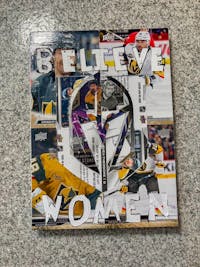David Bowie's standing strong
Last Wednesday, I found myself once again in the Orpheum Theater, this time sitting in the lower balcony level. I was there, along with an audience running the generation gambit, for none other than David Bowie, on a tour that hit New York City five times and Philly once before ending up in Boston. And this is David Bowie! Ziggy Stardust, The Thin White Duke, the rock 'n' roll chameleon who has somehow stayed musically relevant and sincere, despite the many changing faces that pop art has embraced over the last four decades. For all of those who put Bowie strictly in the '80s grouping because of "Let's Dance" and "Fashion," please take note: Bowie is more than the sum of one genre, even more than all of them combined, and Wednesday's concert proved this beyond a doubt.
For those who want to know if he played the "old stuff" that many feel is the "good stuff," the answer is yes and no. Yes, he played older material, including a beautiful "Life On Mars?," a strong "Starman," a crowd-pleasing "Rebel, Rebel" and a take on "Heroes" that made me thankfully forget Jakob Dylan's decent but not as powerful rendition.
But these songs were not the most interesting part of the show. Bowie was the star of the show, approaching the stage slowly, deliberately, so as to sustain the tension and drama of the initial moment of the concert. He stood motionless in front of the microphone, knowing full well how anxious everyone was just to see him in such a small venue.
And of course, in typical Bowie humor, he let the audience know he knew what he was doing for us: "Wow, you're so close . I hope you appreciate it." And then he smiled, letting go of the persona and allowing himself, as much as a performer can, to be himself, joking and making eye contact with those that at other times, were too far away for him to notice distinctly.
There are three points on which I wish to elaborate: Bowie's voice, his band and the set list. First, the man can still sing, and there is even a maturity from his years that adds gravity to the words that was lacking in his younger years. Bowie is a professional in ways the average modern rock singer does not appreciate. He knows how to provide presence without being silly; he knows how to stand, how to inflect, and most importantly, how to not be the center of it all.
As you may imagine, musicians of Bowie's caliber, or fame if you do not personally like his music, command an attentive audience, both on and off the stage. Therefore, he does not enlist mediocre musicians to play with him on records or before audiences. I have probably never been more impressed by the tightness of a backing band, seven members comprising three guitarists, two keyboardists, one drummer and one fantastic bass/guitar player and vocalist, nicely sporting a shaven head and Catholic schoolgirl dress. And, yes, the musician was a female.
This multi-gender, multi-ethnic group created a sound both big and sophisticated, never too loud or cluttered. Everywhere Bowie wanted to go, they were right there with him, singing, playing and dancing along. Bowie pulled back from the limelight to allow his band to take center stage, for a multi-guitar solo, for a female singing duet or for a jam. Since Bowie's only instrument was his voice, there were several moments when he would refrain from the front of the stage, providing room for the music to soak in the well-deserved attention.
And, lastly, the songs themselves. Well, he did play some that I never liked . before, but somehow, he managed to reinterpret "China Girl" into one of my favorite moments of the show. Also, the beginning of "Let's Dance" was retooled as a slow, Spanish-tinged serenade, only to grow into the more popular version, and I truly believe that "Fashion" is a song that is never really experienced or appreciated until you see the man strut and pose, all the while tongue-in-cheek.
Bowie did two very unexpected things, relying on reports of the other six shows from this mini tour. First, he announced a special, "different" song selection and casually went into The Doors' "Alabama Whiskey," from their first album. The band played a lively, free flowing version, staying true to the melody while improvising on the textures and instruments used. And, it was amazing to watch him dance across the stage theatrically, acting like he was singing in a Broadway play.
Then came the encore, featuring the Velvet Underground's "White Light/White Heat," a song significant to Bowie's growth as an artist and a favorite cover form his heyday in the '60s. All these songs, mixed well with some great material from his new album, "Heathen," his best album in years, as well as a rocking "I'm Afraid of Americans," culminated with, of course, the closing number: "Ziggy Stardust." An expected finisher but satisfying nonetheless, it sounded just as good as it did on recordings from 30-some years ago. In a time when most older bands thrive on greatest-hits packages designed for the baby-boomer crowd, Bowie stands in the company of Neil Young and Bob Dylan as musicians who defy classification and era-placement, returning every few years to put the others to shame.



Please note All comments are eligible for publication in The Justice.